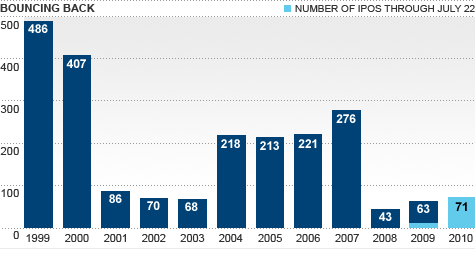Search News

FORTUNE -- The stock debut of Tesla Motors in late June sparked memories of the initial-public-offering mania of a decade ago. As the share sale for the electric-car maker (which is at least two years from profitability) approached, excitement mounted, and the underwriters raised the price to $17, from an expected range of $14 to $16. Demand was so intense that the stock opened at $19 and spiked as high as $30 within a day. The shares promptly tumbled below $15 before settling around $20 in late July.
IPOs are back, and Tesla is a reminder of the lure -- and the perils -- of buying in. Through late July, 223 companies had gone public worldwide this year, raising at least $100 million each, according to Renaissance Capital. If that pace continues, 2010 will produce more IPOs than 2008 and 2009 combined.
Besides Tesla (TSLA), recent deals have included the Agricultural Bank of China, which raked in about $22 billion -- making it one of the largest IPOs in history -- private equity firm KKR (KKR), and RealD (RLD), a maker of 3-D equipment for movies like Avatar. General Motors will also reportedly sell shares by November.
What the wave of new issues means for the markets is unclear. Most often, such a trend reveals more about the past than the future, argues IPO guru Jay Ritter, a finance professor at the University of Florida. "Companies file after the stock market has gone up," he says. If anything, he adds, "high volume suggests that the stock market has gotten overheated."
Still, Bill Buhr, IPO strategist for Morningstar, sees hopeful signs: "The success of Tesla and RealD's IPOs suggests a turnaround with the tech sector at least. Greater tech spending could mean good things for the economy at large. Health care is also looking good. There's a boatload of firms getting ready to go public in that area." (Among the "interesting" IPOs he cites -- but doesn't endorse -- is hospital giant HCA, which plans to emerge from a turn through private ownership.)
Finding the promising new stocks, of course, is the hard part. For every legendary offering -- think Microsoft (MSFT, Fortune 500) or Google (GOOG, Fortune 500) -- there are dozens of dogs. Ritter's decades of research, he says, have yet to identify "any category of IPOs that reliably outperforms on average." Smaller deals are particularly risky, he says; companies with less than $50 million in annual sales before their launch tend to be "disappointments."
For retail investors, the challenge is judging, on scant information, whether IPOs are priced right, says Michelle Lowry, a finance professor at Pennsylvania State University. "With GE (GE, Fortune 500), you have thousands of investors deciding what it's worth," she says. "With an IPO, one investment bank decides."
Retail investors typically can't buy in at the opening price. Institutional investors scarf up the best deals, and individuals get the leftovers. "If you can buy in at the offer price, you probably don't want to be in there," Lowry says.
The safer strategy, apart from avoiding new issues entirely, is to wait until a few months after launch, when you're better able to gauge the stock's value, and its highly volatile first days are past. One promising stock in that category, according to Chris Retzler of the Needham Small Cap Growth Fund, is Financial Engines (FNGN), which provides online advice, mostly about retirement planning. The stock made its debut in March at $12, bumping up and down in a volatile market to nearly $15 at the end of July. "With the decline of traditional pensions," Retzler says, "we're asking people to take more of a role in managing their own money, and Financial Engines helps with that."
Investors who want to buy into IPOs but sidestep some hazards of single stocks can purchase the First Trust U.S. IPO Index Fund (FPX). The ETF, which owns the stocks in the IPOX 100 U.S. index, consists of shares added seven days after launch and held for about four years. It lost less than the S&P 500 (SPX) over the past three years and returned 17.9% over the past year, compared with 11.8% for the S&P. Excitement, it seems, has returned to IPOs. ![]()



| Overnight Avg Rate | Latest | Change | Last Week |
|---|---|---|---|
| 30 yr fixed | 3.80% | 3.88% | |
| 15 yr fixed | 3.20% | 3.23% | |
| 5/1 ARM | 3.84% | 3.88% | |
| 30 yr refi | 3.82% | 3.93% | |
| 15 yr refi | 3.20% | 3.23% |
Today's featured rates:



| Company | Price | Change | % Change |
|---|---|---|---|
| Ford Motor Co | 8.29 | 0.05 | 0.61% |
| Advanced Micro Devic... | 54.59 | 0.70 | 1.30% |
| Cisco Systems Inc | 47.49 | -2.44 | -4.89% |
| General Electric Co | 13.00 | -0.16 | -1.22% |
| Kraft Heinz Co | 27.84 | -2.20 | -7.32% |
| Index | Last | Change | % Change |
|---|---|---|---|
| Dow | 32,627.97 | -234.33 | -0.71% |
| Nasdaq | 13,215.24 | 99.07 | 0.76% |
| S&P 500 | 3,913.10 | -2.36 | -0.06% |
| Treasuries | 1.73 | 0.00 | 0.12% |
|
Bankrupt toy retailer tells bankruptcy court it is looking at possibly reviving the Toys 'R' Us and Babies 'R' Us brands. More |
Land O'Lakes CEO Beth Ford charts her career path, from her first job to becoming the first openly gay CEO at a Fortune 500 company in an interview with CNN's Boss Files. More |
Honda and General Motors are creating a new generation of fully autonomous vehicles. More |
In 1998, Ntsiki Biyela won a scholarship to study wine making. Now she's about to launch her own brand. More |
Whether you hedge inflation or look for a return that outpaces inflation, here's how to prepare. More |